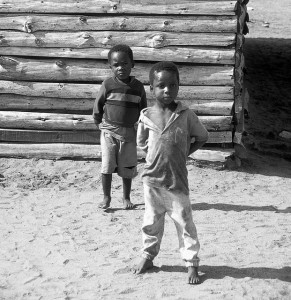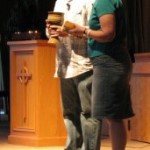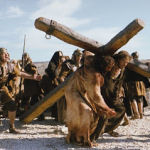 This post will get me labeled as a heretic from both the Protestants and Roman Catholics. I want us to consider that all of us may regularly overlook a true sacrament of the gospel, and in the 2000 years of Christianity, I am not the first person to bring this up. John Wesley makes the case in Sermon 98 that if we normally consider the ordinances and means of grace to be equivalent terms, then we must consider another act. John Wesley called it “visiting the sick,” but I will define it more broadly as acts of mercy.
This post will get me labeled as a heretic from both the Protestants and Roman Catholics. I want us to consider that all of us may regularly overlook a true sacrament of the gospel, and in the 2000 years of Christianity, I am not the first person to bring this up. John Wesley makes the case in Sermon 98 that if we normally consider the ordinances and means of grace to be equivalent terms, then we must consider another act. John Wesley called it “visiting the sick,” but I will define it more broadly as acts of mercy.
Let us view it in light of the Wesleyan Quadrilateral. Scripture commands God’s people, in both the Old (Deuteronomy 24:20) and New Testament (1 Timothy 5:3) to take care of widows, orphans, strangers and the poor. Traditionally, acts of mercy have been a part of the work of the Church, and it is reasonable that those who are to be known by our love (John 13:35) should do such work. So I am left asking myself, why is this sometimes lacking in our everyday Christian life experience, when even other religions consider giving to the poor a holy obligation, and are we missing an opportunity for God’s grace by ignoring acts of mercy?
Still, do I go too far in proposing acts of mercy to be sacramental? The Reformers asked themselves the following questions when considering the sacraments:
- Did Jesus command it?
- Is Jesus’ presence promised?
- Had the ritual overshadowed the meaning, or become abused?
Baptism is a sign of identification as circumcision in the Old Testament. Jesus commands it and promises his presence in Matthew 28:19-20. The Lord’s Table is the New Covenant expression of the Passover. Jesus instituted it, and says the bread and wine is his body and blood (Mark 14:22-26; 1 Corinthians 11:23-26). God gives the command to take care of the widows, orphans, and strangers in Deuteronomy 24:20, and Jesus states that he will judge people based upon their acts of mercy towards those who were hungry, thirsty, strangers, in need of clothing, and in prison because he himself is present in those people (Matthew 25:31-46). In all of these, if done right, the ritual will not overshadow the meaning nor be abusive.
Picture the sacramental expression of mercy this in the early church when they celebrated the Eucharist as part of the agape/love feast. The Eucharist was sort of like what we do: a chunk of bread and a common cup. Then they would all sit down to a big meal (potluck) and share food. It was part of the worship service, and it concluded with a giving of thanks and closing prayer. Part of worship in the Christian community included providing food for those who had very little money and not enough to eat through the love feast and communion.
Are we feeding the hungry, giving drinks to the thirsty, showing hospitality to the outcasts, clothing the poor, and caring for the distressed, or do we need a SoulShift to move from Comsumers to Stewards?
Other posts in this series:
- The Sacraments as Means of Grace part 1: The Lord’s Supper
- The Sacraments as Means of Grace part 2: Baptism
- The Sacraments as Means of Grace part 3: Marriage
- The Sacraments as Means of Grace part 4: Ordination
- The Sacraments as Means of Grace part 5: Reconciliation
- The Sacraments as Means of Grace part 6: Anointing of the Sick
- The Sacraments as Means of Grace part 7: Confirmation
- The Sacraments as Means of Grace part 8: Acts of Mercy
photo credit: jtravism via photopin cc
©2012 Paul Tillman







This is really interesting Paul – if I didn’t have to literally run to work, I would comment more on it. I’ll think about this though.
ICXC NIKA
Jason @ AMC